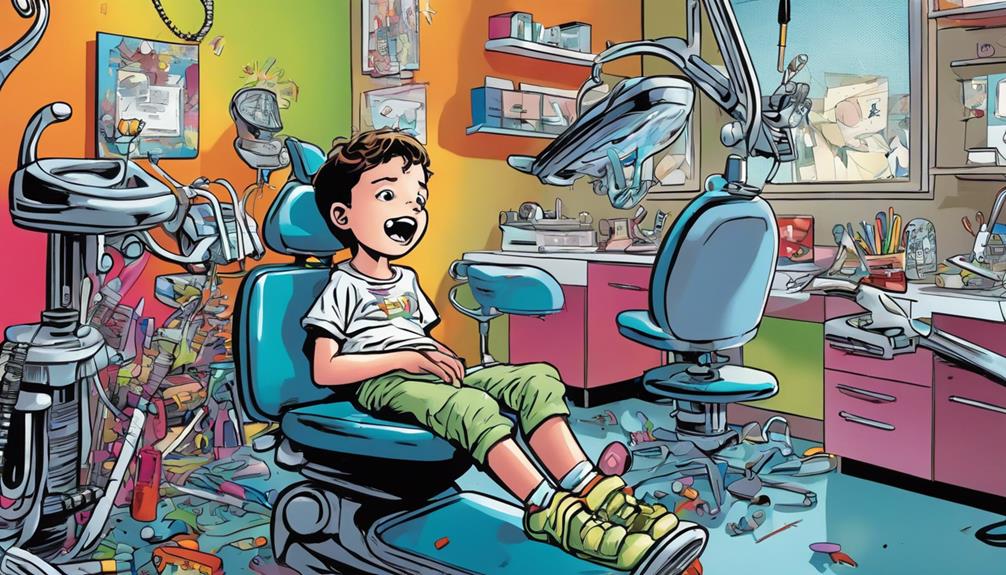Stress can greatly affect your kids' dental health in ways you might not expect. When children face educational pressures, they may grind their teeth, leading to enamel damage and jaw pain. Chronic stress often results in poor oral hygiene, increasing the risk of cavities and gum disease. You might notice them craving sugary snacks, which can worsen dental issues. Additionally, emotional stress can cause painful canker sores, complicating their eating and speaking. Managing stress through routine, open communication, and professional dental check-ups can make a big difference in their oral health. Discovering more can help you navigate these challenges effectively. Encouraging your children to maintain a balanced diet and oral health routine can also help alleviate the effects of stress on their dental health. It’s important to educate them on the importance of eating nutritious foods and practicing good oral hygiene to prevent further damage. By taking a proactive approach to addressing stress and its impact on their dental health, you can help ensure that your children maintain a healthy and happy smile.
Key Takeaways
- Educational stress can lead to anxiety, impacting children's focus and resulting in poorer oral hygiene practices.
- Chronic stress may cause bruxism, leading to enamel damage and jaw pain.
- Elevated cortisol levels weaken the immune system, increasing susceptibility to oral infections and gum disease.
- Emotional distress can trigger unhealthy eating habits, resulting in higher consumption of sugary snacks that damage dental health.
Understanding Educational Stress

Educational stress is the pressure you feel as a child to excel academically, often driven by exams, homework, and social expectations. This kind of stress can markedly impact your mental health, leading to anxiety and affecting your overall well-being.
While a manageable level of stress can motivate you to perform better, excessive educational stress often creates a cycle of underachievement. You may find it hard to focus, leading to lower grades and increased feelings of anxiety.
Recognizing the signs of educational stress is essential for you and your caregivers. It's important to implement effective stress management techniques to help you cope. Techniques like mindfulness practices, physical activities, and proper time management can make a considerable difference in how you handle academic pressure.
These strategies not only support your mental health but also create a healthier environment for learning. As you navigate your educational journey, remember that understanding educational stress is fundamental.
The Link Between Stress and Dental Health

Stress can seriously impact your child's dental health in various ways.
From increased risk of gum disease to teeth grinding, it's crucial to recognize how stress-induced oral issues can affect their overall well-being.
Stress-Induced Oral Issues
Chronic stress can lead to several oral health issues in kids, including teeth grinding and increased susceptibility to gum disease.
When your child faces stress, they might unknowingly grind their teeth, a condition known as bruxism. This not only damages enamel but can also cause jaw pain. Elevated cortisol levels weaken their immune system, making them more vulnerable to gum disease and oral infections.
Additionally, stressed children often neglect their oral hygiene routines. This neglect can result in a higher risk of cavities and plaque buildup, which can further compromise their dental health. Stress can also worsen inflammation in the gums, increasing the likelihood of conditions like gingivitis.
Moreover, emotional distress from stress may trigger the formation of canker sores, leading to painful oral ulcers that hinder eating and speaking.
It's crucial to recognize these stress-induced oral issues early on, as they can greatly affect your child's overall well-being and confidence. By understanding the connection between stress and oral health, you can take steps to support your child's dental hygiene and help them manage stress effectively.
Coping Strategies for Kids
Finding effective coping strategies can help your child manage stress and ultimately protect their dental health.
Start by encouraging your child to engage in hobbies and activities they enjoy. These can notably reduce stress levels, allowing them to maintain better oral hygiene routines. Incorporating mindfulness techniques like meditation or yoga can also lower stress, decreasing the risk of issues such as bruxism and gum disease.
Establishing a consistent daily schedule provides stability that can help mitigate stress and promote better dental care habits.
Don't underestimate the power of open communication; discussing stress and its effects can make your child feel less isolated and more inclined to stick to their oral hygiene routines, even during tough times.
Encouraging regular physical activity serves as a natural stress reliever, benefiting both their mental well-being and dental health by boosting immune responses.
Importance of Regular Check-ups
Regular dental check-ups play an essential role in identifying and addressing stress-related dental issues in children before they escalate. During these visits, dentists can spot increased plaque buildup and signs of bruxism, which can indicate that your child is experiencing stress. By catching these problems early, you can help prevent more serious conditions like gum disease and cavities.
Dentists also provide personalized advice on maintaining good oral hygiene, especially during stressful periods when routines might slip. Regular check-ups guarantee that your child continues to practice essential habits like brushing and flossing, reducing the risk of neglect that often occurs during high-stress times.
Moreover, these visits offer an opportunity for education. Dentists can help both you and your child understand the connection between stress and oral health, empowering you to tackle stress-related dental issues proactively.
Physical Effects of Stress on Teeth

When stress hits kids, it can really take a toll on their teeth.
You might notice signs like teeth grinding, dry mouth, or even swollen gums.
Understanding these physical effects is essential for keeping your child's smile healthy.
Bruxism and Tooth Damage
Many kids facing stress may unknowingly grind their teeth, leading to significant damage over time. This condition, known as bruxism, often occurs during sleep and can cause enamel wear, resulting in increased tooth sensitivity. As the enamel erodes, the risk of developing cavities rises, making dental hygiene even more vital.
If your child experiences chronic bruxism, they might also complain of jaw pain or discomfort, which could indicate the onset of Temporomandibular Joint Disorder (TMJD). Studies show that children under stress are more likely to grind their teeth, and this habit can lead to serious dental issues that require restorative treatments, like crowns or fillings.
It's essential to keep an eye on your child's oral health, especially if they're exhibiting signs of teeth grinding. Encouraging good dental hygiene practices can help mitigate some of the damage caused by bruxism.
Regular dental check-ups are vital, as a dentist can identify early signs of tooth damage and suggest strategies to reduce stress, ultimately protecting your child's smile from the harmful effects of bruxism.
Dry Mouth Consequences
Stress can considerably reduce saliva production, leading to dry mouth and increasing the risk of tooth decay and gum disease. When saliva levels drop, your child's mouth loses its natural cleansing ability, making it easier for harmful bacteria to thrive. This can result in cavities as well as oral infections that complicate oral hygiene practices.
Dry mouth also creates discomfort, which can affect your child's ability to swallow properly and maintain a balanced diet rich in tooth-friendly nutrients. The lack of saliva can contribute to bad breath and exacerbate inflammation in the gums, setting the stage for more severe issues like periodontal disease.
If stress continues to impact saliva production, chronic dry mouth can lead to painful canker sores, making oral hygiene even more challenging. It's crucial to monitor these symptoms, as they can lead to long-term dental consequences if left unaddressed.
Increased Gum Inflammation
Chronic stress can lead to increased gum inflammation, making your child's gums more vulnerable to conditions like gingivitis. When your child experiences stress, cortisol levels rise, triggering heightened inflammation in their gums. This can exacerbate any existing gum issues and may lead to more severe oral health problems if not addressed.
Stress often reduces saliva production, which is crucial for maintaining gum health. Saliva helps wash away food particles and neutralize acids, so lower saliva levels can worsen gum inflammation.
Additionally, children under stress may grind their teeth, a condition known as bruxism. This grinding can physically irritate the gums, further contributing to inflammation.
During stressful times, your child might neglect their oral hygiene routines, leading to plaque buildup. This neglect increases the risk of developing periodontal disease, a serious gum infection that can damage the soft tissue and bone supporting the teeth.
To combat these issues, it's important to encourage good oral hygiene practices and address your child's stress levels, ensuring their gums remain healthy and resilient against inflammation.
Behavioral Impact on Oral Hygiene

How does the pressure of daily life affect your child's commitment to oral hygiene? When kids face stress from school or social situations, they often neglect their oral hygiene routines. Skipping brushing and flossing becomes common, leading to increased plaque buildup and a higher risk of cavities. The pressure of academic expectations can make them rush through their oral care, resulting in incomplete brushing and flossing practices.
Research shows that stress can diminish your child's awareness of the importance of maintaining good oral hygiene, ultimately harming their oral health. Behavioral changes, such as reaching for sugary comfort foods, can worsen dental issues by increasing the risk of tooth decay. Kids under stress might also develop anxiety about dental visits, which further compounds their neglect of essential oral health practices.
As a parent, recognizing these patterns is essential. Open conversations about stress and its impact on daily habits can help your child prioritize their oral hygiene despite life's pressures. Encouraging a consistent routine and providing support can greatly improve their dental health, reducing the chances of cavities and decay.
Stress-Induced Eating Habits

When kids encounter tough situations, they often turn to sugary comfort foods, which can seriously impact their dental health. Stress can lead to emotional eating, making them crave sugary snacks that heighten the risk of cavities and gum disease. These unhealthy eating habits disrupt their regular meal patterns, leading to inconsistent oral hygiene practices.
| Stress Factor | Common Sugary Snacks | Impact on Dental Health |
|---|---|---|
| School pressure | Candy bars | Increases cavity risk |
| Family issues | Soda | Promotes plaque buildup |
| Social challenges | Ice cream | Contributes to gum disease |
During stressful times, kids might skip brushing after indulging in these high-calorie treats, which only worsens their oral hygiene. It's critical to monitor their eating habits and steer them toward healthier snacks. By doing so, you can help protect their dental health and reduce the likelihood of cavities and gum disease. Encouraging balanced meals and regular oral hygiene practices is essential to combat the adverse effects of stress-induced eating.
Coping Mechanisms and Their Effectiveness

When it comes to managing stress, effective coping mechanisms can make a big difference for your child's dental health.
Incorporating consistent routines and engaging in enjoyable activities not only helps reduce stress but also encourages better oral hygiene practices.
Effective Stress Management Techniques
Effective stress management techniques, like mindfulness and regular physical activity, can greatly improve your child's dental health by reducing stress-related issues. Here are three effective strategies to take into account:
- Mindfulness Practices: Techniques such as deep breathing and meditation can greatly lower your child's stress levels, enhancing their mental state and promoting good oral hygiene practices.
- Regular Physical Activity: Engaging in physical activities not only relieves stress but also strengthens the immune system, reducing susceptibility to oral infections and promoting overall oral health.
- Hobbies and Enjoyable Activities: Encouraging your child to participate in fun activities can serve as a distraction from stressors, fostering a proactive approach to maintaining their oral health.
Importance of Consistent Routines
Establishing consistent daily routines can greatly assist your child manage stress, leading to improved oral hygiene and overall dental health. When children have regular schedules, they're less likely to skip brushing and flossing, even during stressful times. Here's how consistent routines can make a difference:
| Routine Type | Benefits | Examples |
|---|---|---|
| Oral Hygiene | Reduces risk of dental issues | Set specific times for brushing and flossing |
| Mealtime Structure | Encourages healthy dietary choices | Regular family meals with balanced foods |
| Stress-Relief Activities | Mitigates physiological stress effects | Include exercise, hobbies, or relaxation time |
| Open Communication | Fosters supportive environment | Discuss stress and its impact on oral health |
| Consistency in Sleep | Promotes overall well-being | Set a regular bedtime to guarantee adequate rest |
Signs of Stress-Related Dental Issues

Noticing signs of stress-related dental issues in kids can help parents take proactive steps to protect their oral health. Here are three key signs to watch for:
- Bruxism: If your child grinds their teeth, especially at night, it might be a sign of stress. This can lead to enamel wear and jaw pain.
- Neglected Oral Hygiene: Increased stress levels often cause kids to skip brushing or flossing, heightening the risk of cavities and gum disease.
- Dietary Choices: Stress can lead to unhealthy eating habits. If you notice your child opting for sugary snacks more often, it can contribute to decay and further dental problems.
Other signs may include the development of painful canker sores or dry mouth. The latter reduces saliva, which is vital for neutralizing acids and maintaining oral hygiene.
Preventive Measures for Parents

Recognizing stress-related dental issues is just the first step; implementing preventive measures can greatly enhance your child's oral health and overall well-being.
Start by establishing a consistent daily routine that includes regular brushing and flossing. This helps reduce stress levels and keeps your child focused on maintaining healthy teeth.
Encourage your child to engage in physical activities, like sports or dance. These activities act as natural stress relievers, benefiting both their mental health and dental well-being.
Open communication is also key; talk about academic and social pressures, allowing your child to express their feelings and reduce any sense of isolation that can lead to neglecting oral care.
Nutrition plays a vital role as well. Provide a balanced diet rich in fruits and vegetables to support overall health and reduce the risk of cavities and gum disease linked to stress-induced poor dietary choices.
Finally, don't forget regular dental check-ups. These are essential for the early detection of stress-related dental issues, allowing for timely intervention and guidance on maintaining oral health during stressful periods.
Importance of Professional Dental Care

Understanding the importance of professional dental care can greatly impact your child's ability to cope with stress-related dental issues. By prioritizing regular dental visits, you can help your child maintain peak oral health and prevent potential problems.
Here are three key benefits of professional dental care:
- Early Detection: Dentists can identify issues like bruxism and TMJD before they escalate, ensuring timely interventions that protect your child's dental well-being.
- Personalized Guidance: Dental professionals offer tailored advice for maintaining oral health during stressful times, helping to reduce the impact of stress on your child's teeth and gums.
- Preventive Measures: Regular dental check-ups allow for the prevention of gum disease and other health issues that may arise due to stress-related behaviors.
Building Healthy Stress Management Habits

To support your child's dental health, it's important to build healthy stress management habits that promote emotional well-being and foster consistent oral care routines. Stress can contribute to poor oral health, leading to issues like bruxism and skipped brushing.
Establishing a daily routine provides stability, helping your child manage stress and maintain good oral hygiene.
Encourage physical activities, such as sports or dance, to effectively reduce stress. These activities not only promote fitness but also keep your child engaged, which can lessen anxiety.
Mindfulness practices like meditation and deep breathing exercises can notably help your child relax, leading to improved self-care habits.
Additionally, encourage your child to pursue hobbies they enjoy. These outlets allow them to express themselves and serve as a productive way to manage stress.
Open communication about feelings and stressors is also essential; it fosters a proactive approach to their dental health, making it easier for them to prioritize oral hygiene.
Frequently Asked Questions
Why Do Children Have Poor Dental Health?
Children often have poor dental health because they forget to brush or floss regularly, especially when overwhelmed by life's pressures. Neglecting oral hygiene, combined with unhealthy snacks, leads to cavities and gum issues.
Can Extreme Stress Cause Dental Problems?
Can extreme stress really cause dental problems? Yes, it can. Stress affects saliva production, increases teeth grinding, and leads to neglecting oral care, all of which can seriously harm your child's dental health.
What Is the Relationship Between Stress and Oral Health?
Stress negatively impacts your oral health by increasing teeth grinding, neglecting hygiene, and raising cortisol levels, which can weaken your immune system. Managing stress effectively can help protect your teeth and gums from further damage.
Does Dental Health Influence a Child's Overall Health?
Can you imagine your child struggling with dental issues? Poor dental health affects their overall health, leading to pain, missed school, and even systemic problems. Keeping their teeth healthy supports their development and well-being.
Does Stress or Sleeping Habits Have a Greater Impact on Kids’ Dental Health?
Many parents wonder if their child’s sleeping habits impact dental health. While stress can contribute to teeth grinding and poor oral hygiene, studies show that irregular sleeping patterns and inadequate sleep can also have a significant impact on a child’s dental health. Ensuring good sleep hygiene can help maintain healthy teeth and gums.
Conclusion
In the whirlwind of school projects and social pressures, it's easy to overlook how stress can sneak into your child's dental health like a shadow at dusk.
By recognizing the signs and taking preventive measures, you can help your child build resilience, much like a sturdy tree weathering a storm.
Encourage healthy habits and maintain regular dental visits, ensuring their smiles shine bright even in turbulent times.
After all, a healthy mouth can be a beacon of confidence for your child.









